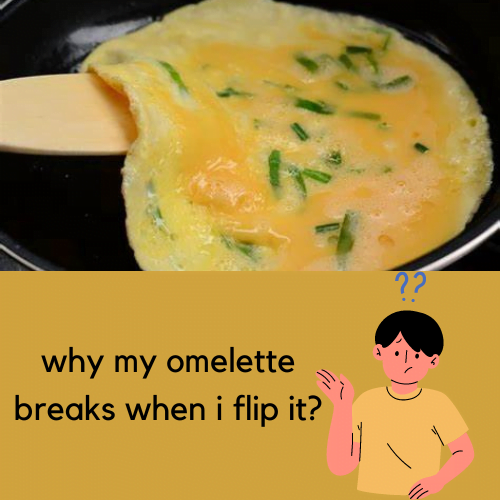Cooking the perfect omelette can be a pleasant morning ritual for many people, but the frustration of a broken omelette can quickly diminish the experience. If you’ve ever found yourself worried about why my breaks when I flip it , you’re not alone. In this guide, we’ll consider the common reasons behind this cooking complexity and provide practical solutions to ensure that your omelette flipping efforts are successful each time.

Before considering the reasons behind broken omelettes, it is important to understand the science behind the cooking process. Omelette is essentially a delicate balance of protein, fat, and moisture. When heated, proteins accumulate, creating a solid structure, while fat contributes to taste and texture. However, improper handling or cooking techniques can disrupt this delicate balance, causing the omelette to break down.
1.Inadequate preparation of pan:
One of the main reasons behind broken omelettes is inadequate pan preparation. A well-experienced and properly pre-heated pan is essential to ensure that the omelette slips easily when flipped. Without proper preparation, the omelette can stick to the pan, causing it to burst when flipped. Insufficient pan preparation behind broken omelettes is a common reason.
Solution: Make sure your pan is well-tested or non-sticky and heat it to mid-flame before adding your egg mixture. It prevents sticking and facilitates flipping easily. It takes cleverness and practice to master the art of flipping omelettes. Avoid using too much force or flipping too aggressively, as this can break the omelette. Instead, use a soft wrist motion and tilt the pan slightly away from you for a smooth flip. To avoid sticking, make sure your pan is properly seasoned or non-sticky. Additionally, preheat the pan to mid-heat and add a small amount of butter or oil before pouring it into the egg mixture.
2.Wrong ratio of egg to pan:
Another common mistake that can cause broken omelettes is to use too many egg mixtures for pan size. When eggs are high, they can spread over the edges of the pan, making it difficult to flip the omelette without breaking it. Maintaining the right egg-to-pan ratio is very important for the success of the omelette. Using too much egg mixture for pan size can cause spread and breakage.
Solution: Choose a pan of the appropriate size or reduce the number of eggs to achieve perfect balance. Use a pan of the appropriate size for the number of eggs to ensure that the omelette cooks evenly and can be easily flipped. A smaller pan or reducing the number of eggs can help maintain an appropriate egg-to-pan ratio.
3.Ideal egg-to-pan ratio:
Maintaining the right egg-to-pan ratio is very important for the success of the omelette. Using too much egg mixture for pan size can cause spread and breakage. Choose a pan of the appropriate size or reduce the number of eggs to achieve perfect balance. Maintaining the right egg-to-pan ratio is very important for the success of the omelette. Using too much egg mixture for pan size can cause spread and breakage. Choose a pan of appropriate size or reduce the number of eggs to achieve perfect balance.
Solution: Use a pan of the appropriate size for the number of eggs to ensure that the omelet cooks evenly and can be easily flipped. A smaller pan or reducing the number of eggs can help maintain an appropriate egg-to-pan ratio.
Overcooking omelettes:
Overcooking the omelette can also result in dryness and breakage, making it more likely to break down when flipped. When eggs are cooked for too long, they lose their moisture content and harden, making them less flexible and more likely to explode.
Solution: Cook the omelette on medium low heat and pay close attention to its composition. Once the edges are set but the centre is still slightly runny, it’s time to flip. Excessive cooking should be avoided to maintain the softness of the omelette and avoid breakage.
Lack of proper technique:
Flipping omelettes is a skill that requires practice and finesse. Incorrect flipping techniques, such as using too much force or flipping too aggressively, can cause the omelette to break down.
Solution: When flipping the omelette, use a light wrist motion to slide it onto the spatula before flipping it. Additionally, make sure the pan is tilted a little away from you to make the flipping process easier.
Understanding the science behind omelette cooking can enhance your cooking skills. Overcooking the eggs can result in dry, breakage, which puts the omelette at risk of breaking. Cook on a medium low flame and flip over when the edges are set but the centre remains slightly lighter for a soft, moist omelette.
Mastering the art of flipping an omelette requires patience, practice, and an understanding of the factors that can lead to breakdown. By solving common problems such as inadequate pan preparation, incorrect ratio of egg to pan, excessive ripening, and lack of proper technique, you can enjoy a fully flipped omelet every time. Remember to experiment with different pan sizes, heat levels, and flipping techniques to find what works best for you. With perseverance and determination, you will make world’s best omelette.
